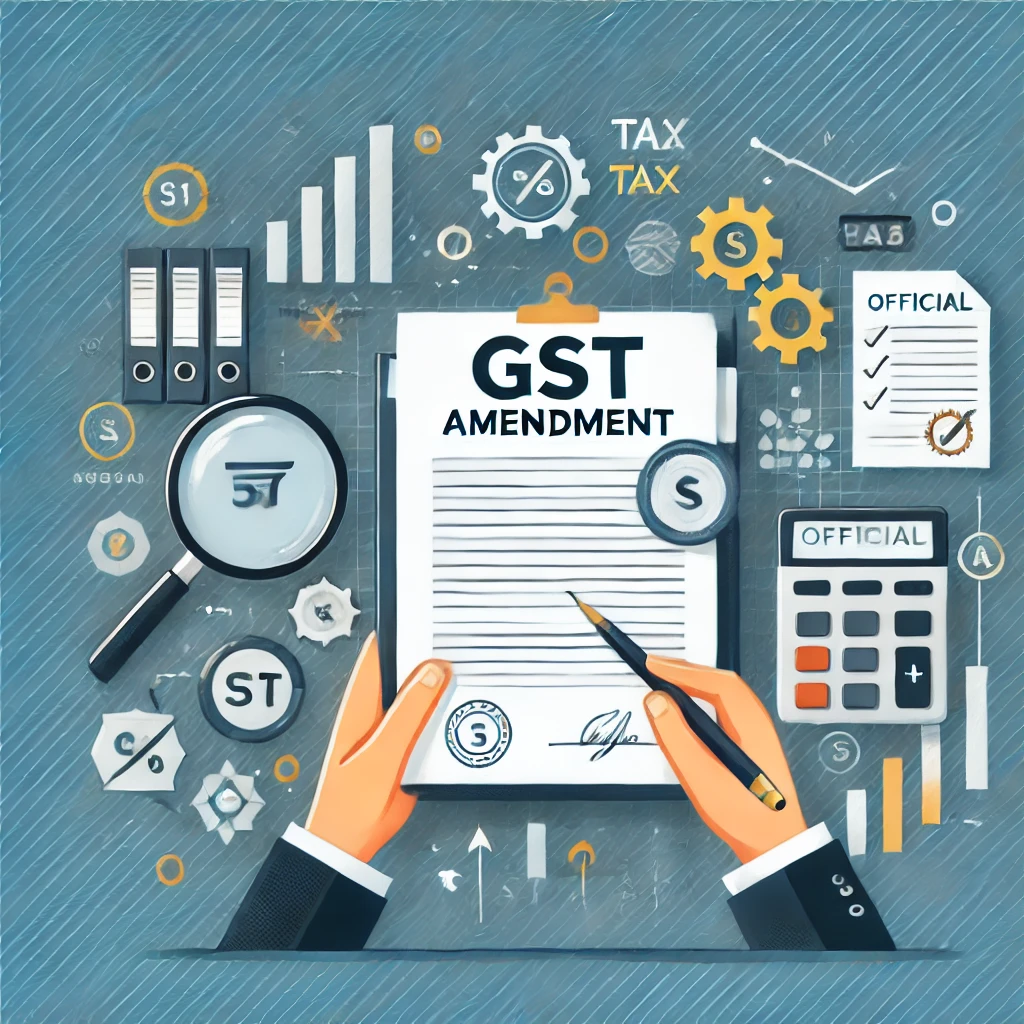Start Business
Start Business
Registration & License
Registration & License
Trademark Filing
Trademark Filing
Goods & Service Tax
Goods & Service Tax
Income Tax
Income Tax
MCA Services
Tender Registration
Tender Registration
Others
GST Amendment Filing in India – Update Registration Details, Ensure Compliance & Avoid Penalties
Best & Reasonable Plans
Smart solutions,fair prices - your success starts with the Innovative solutions, competitive pricing – your journey to success begins with the perfect balance for growth!

OVERVIEW
GST amendment is the process of correcting errors or updating details in previously filed GST returns or registration information. It ensures that your GST records are accurate, up-to-date, and compliant with tax laws. Whether it’s correcting invoice details, updating business information, or adjusting input tax credit (ITC) claims, GST amendments help businesses maintain transparency and avoid penalties. The process is straightforward and can be done through the GST portal, making it easy for businesses to stay compliant and audit-ready.
Key Features of GST Amendment
- • Error Correction in Returns : GST amendments allow businesses to correct mistakes in previously filed returns, such as incorrect invoice details, tax amounts, or ITC claims, ensuring accurate reporting.
- • Updating Business Details : Businesses can amend registration details like name, address, bank account information, or additional places of business, keeping their GST profile current.
- • Seamless and User-Friendly Process : The GST portal provides a simple and efficient interface for filing amendments, making the process quick and hassle-free.
Why is GST Amendment Important?
GST amendment is crucial for maintaining accurate and compliant GST records. Errors in returns or outdated registration details can lead to mismatches, penalties, or notices from tax authorities. By filing amendments, businesses can correct mistakes, update information, and ensure their records align with actual transactions. This not only reduces the risk of disputes but also enhances transparency and credibility with tax authorities. Additionally, accurate records are essential for claiming input tax credit (ITC) and preparing for audits, making GST amendments a vital part of GST compliance.
Types of GST Amendments
Amendment of GST Registration Details
Businesses can amend their GST registration details to reflect changes such as a new business name, updated address, or revised bank account information. This also includes adding or removing authorized signatories or including additional places of business. Amendments to registration details must be filed within 15 days of the change. Keeping registration details up-to-date ensures that your business remains compliant with GST laws and avoids issues during audits or inspections. For example, if a business relocates to a new address, updating the GST registration ensures that all communications from tax authorities reach the correct location.
Amendment of GST Returns
Errors in previously filed GST returns, such as incorrect invoice details, mismatched input tax credit (ITC) claims, or wrong tax liability calculations, can be corrected through amendments. Businesses can adjust these errors in subsequent returns by providing the correct details or filing an amendment application. For instance, if a business mistakenly underreported its sales in GSTR-1, it can correct the error in the next return by adjusting the values. This ensures accurate reporting, minimizes discrepancies, and reduces the risk of penalties or notices from tax authorities.
Amendment of HSN/SAC Codes
Businesses can amend or update Harmonized System of Nomenclature (HSN) or Service Accounting Code (SAC) details in their GST returns to ensure accurate categorization of goods and services. HSN/SAC codes are essential for classifying products and services correctly, and errors in these codes can lead to mismatches or compliance issues. For example, if a business mistakenly used an incorrect HSN code for a product, it can amend the code in the next return to ensure accurate reporting and avoid potential disputes during audits.
Silent Features
Real-Time Updates on GST Portal
No Separate Form for Return Amendments
Multiple Amendments Allowed
Auto-Populated Data for Corrections
No Fees for Amendments
Instant Acknowledgment
Advantages of filing GSTR-9
- Prevents Mismatch Notices : Filing amendments ensures that your GST records match your financial statements and invoices, reducing the risk of mismatch notices from tax authorities.
- Enhances Input Tax Credit (ITC) Claims : Amendments allow businesses to correct errors in ITC claims, ensuring they maximize their credits and avoid financial losses due to incorrect filings.
- Improves Business Credibility : Accurate and up-to-date GST records enhance your business’s credibility with customers, suppliers, and tax authorities, building trust and reliability.
- Facilitates Smooth Audits : Regular amendments ensure your records are accurate and audit-ready, minimizing the risk of disputes or penalties during GST audits.
- Supports Business Expansion : Amendments allow businesses to update details like additional places of business or new bank accounts, supporting seamless expansion and operational flexibility.
- Reduces Litigation Risks : By correcting errors and updating details promptly, businesses can avoid disputes with tax authorities, reducing the risk of litigation or penalties.
Documents Required
Proof of Change
GST Registration Certificate
Identity Proof of Authorized Signatory
Board Resolution
Revised Invoices or Returns
Supporting Financial Documents
Step-by-Step Guide For GSTR-9C Filing
Here are 5 steps to complete your GSTR-9C Filing
Step 1
Identify the Error or Change
Step 2
Gather Required Documents
Step 3
Log in to the GST Portal
Step 4
Make the Necessary Changes
Step 5
Submit and Verify
Empowering Your Business to Stay Ahead


Ensuring excellence in every aspect of business operations

Helping businesses to stay ahead of the competition effectively

Providing expert guidance for long-term business growth





